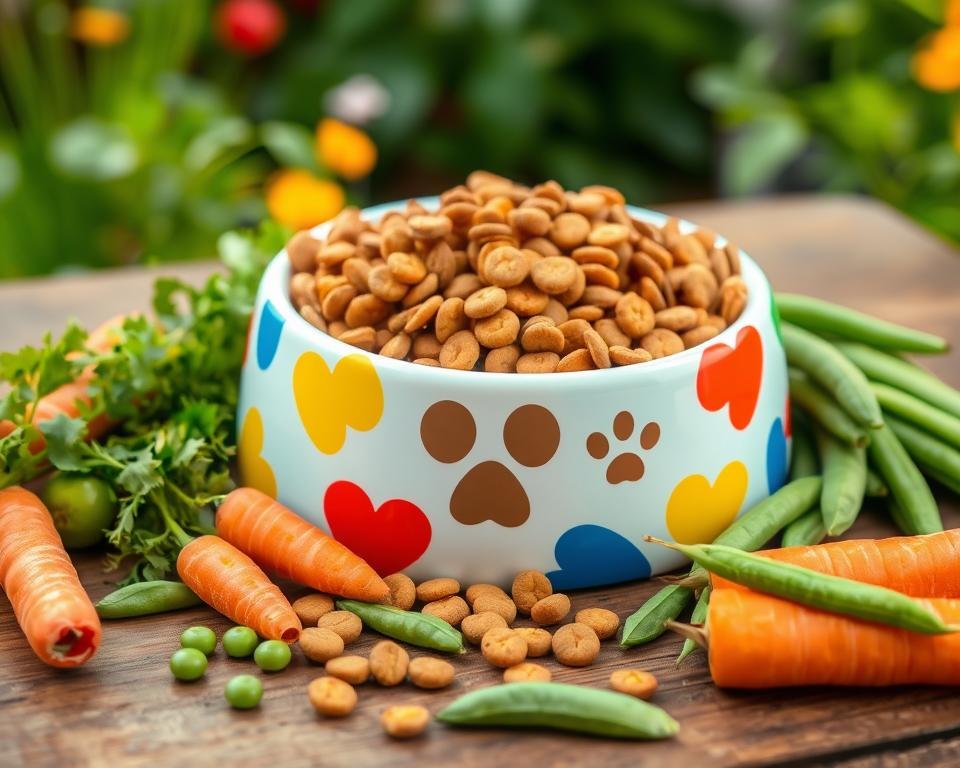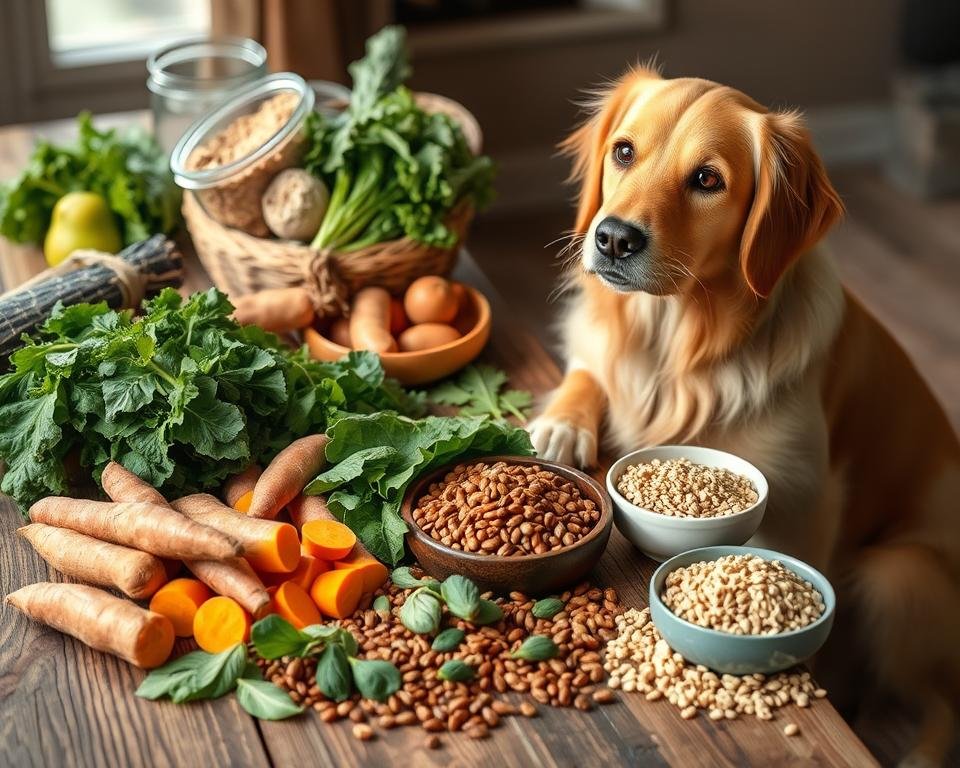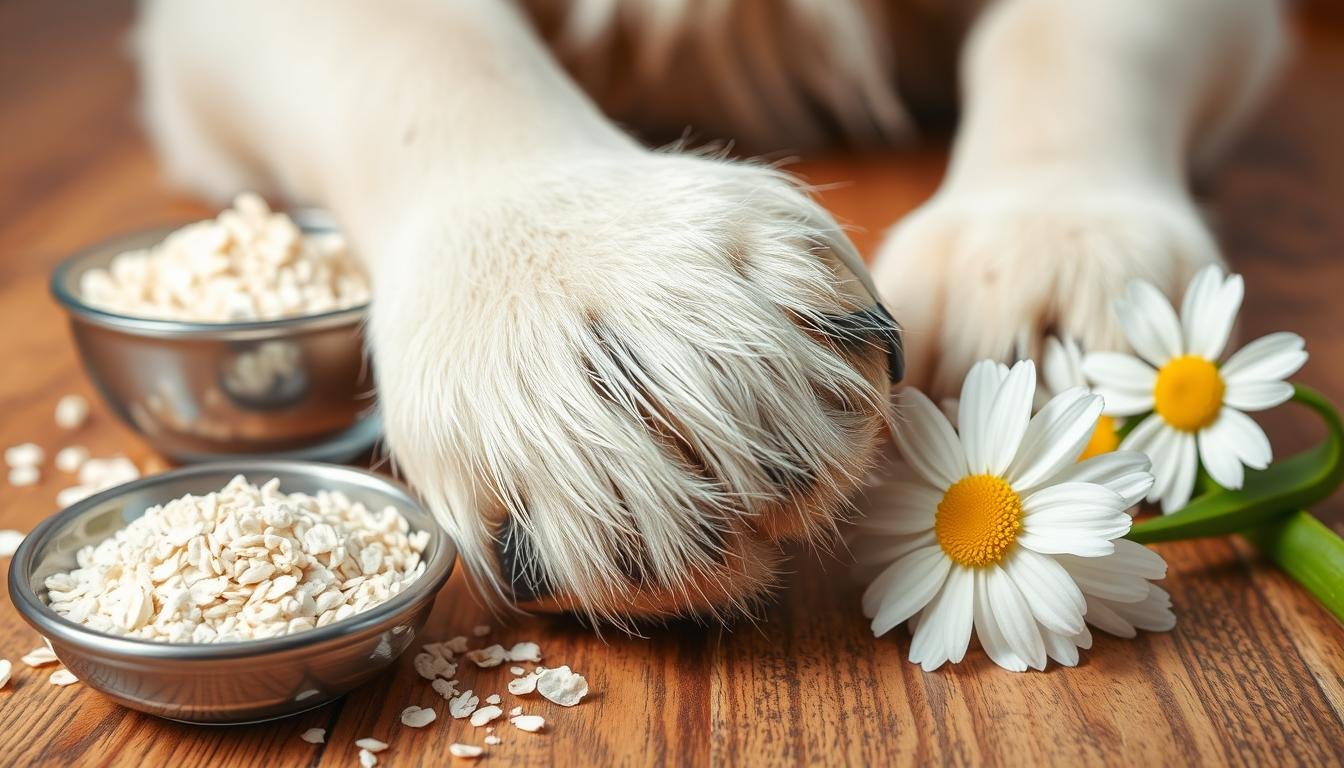Fiber is key for your dog’s health. It helps with bowel movements and gut health. This article will show you how to add fiber to your dog’s diet.
We’ll look at high fiber dog foods and supplements. You’ll learn about different types of fiber and their benefits. This will help your dog digest food better and manage their weight.
Whether you choose natural foods or supplements, knowing the best approach is vital. It’s important for a healthy diet for your dog.
Use our free Pet Calorie Calculator to calculate your Pet’s Calorie need
Understanding the Importance of Fiber in Dog Nutrition
Fiber is key in dog nutrition but often ignored. It helps with digestion, keeps bowels regular, and boosts overall health. Knowing about dietary fiber helps pet owners choose the right foods for their dogs.
Types of Dietary Fiber for Dogs
When considering how to add fiber to a dog’s diet, it’s vital to choose the right sources. Common ingredients high in soluble fiber include oats, beans, and certain fruits like apples and blueberries. These can be incorporated into homemade meals or used as healthy treats. For insoluble fiber, options like pumpkin, sweet potatoes, and green beans are excellent choices. Not only do these foods provide essential nutrients, but they also keep your dog feeling full, which can help in managing weight. It’s important to introduce fiber gradually to avoid any digestive upset, allowing your dog’s system to adjust smoothly.
Dogs and fiber are closely linked when it comes to promoting digestive health. Adequate fiber intake can prevent issues such as diarrhea or constipation, which are common concerns for many pet owners. Furthermore, fiber can assist in regulating cholesterol levels and maintaining a healthy weight, contributing to a longer, healthier life for your furry friend. If you’re considering adding fiber for dogs to their meals, it may be beneficial to consult with your veterinarian. They can help tailor a fiber-rich diet that aligns with your dog’s specific health needs, age, and activity level.
Dogs need both soluble and insoluble fiber. Soluble fiber absorbs water, which can cause gas. It helps with digestion and supports good gut bacteria. Insoluble fiber makes stool bulkier, helping prevent constipation.
Benefits of Fiber for Canine Health
Fiber has many benefits of fiber for canine health. It helps prevent constipation and diarrhea. It also keeps dogs full, which is great for weight management. Plus, it helps control blood sugar levels, which is good for dogs with diabetes.
Signs Your Dog Needs More Fiber
Watching your dog’s bathroom habits is important. If they have constipation or diarrhea often, they might need more fiber. If they’re having trouble losing or gaining weight, adding fiber could help.
How to Add Fiber to Dogs Diet: Natural Food Sources
Adding fiber to your dog’s food is easy and good for their health. Try using high-fiber foods for dogs like pumpkin, green beans, and sweet potatoes. Pumpkin is great because it has both kinds of fiber, helping with digestion and keeping things regular.
Green beans are a tasty, crunchy snack that dogs love. You can give them raw or steamed. Sweet potatoes are another good choice, mashed or cubed, adding fiber and nutrients. Other options include apples (without seeds), brown rice, and carrots, all good for their digestive system.
Leafy greens like kale and broccoli are full of fiber and vitamins. Apples are a yummy snack, and oats and wheatgerm can be added to meals. More fiber in their diet can also make them happier, keep their heart healthy, and fight inflammation.
Adding different high-fiber foods for dogs helps keep their digestive system working well. It can also help with constipation or anal gland issues. Just remember to adjust how much you give based on your dog’s size for the best results.

Safe and Effective Fiber Supplements for Dogs
Adding fiber to your dog’s diet can boost their health. Sometimes, natural sources might not be enough. Fiber supplements for dogs are a good option, helping pets with digestive issues. They ensure your dog gets the fiber they need, addressing health concerns.
Commercial Fiber Products
Many commercial fiber products are available for different needs. Brands like Glandex offer soft chews for digestive health. They mix soluble and insoluble fibers. Products like psyllium-based supplements help with constipation. These supplements offer benefits that natural foods might not.
Proper Dosage Guidelines
Finding the right fiber dosage is key to avoiding health problems. The dosage depends on your dog’s size and weight. Small breeds start with half a teaspoon of powdered fiber, while big breeds can have up to two tablespoons. Slowly increasing the dosage helps avoid upset stomachs.
Potential Side Effects to Watch For
Introducing fiber supplements can cause side effects. Dogs might get gas, diarrhea, or vomit if fiber is added too fast. Always talk to a vet before changing your dog’s diet or adding supplements. Watch how your dog reacts to fiber supplements to see if they’re okay.
Common Mistakes to Avoid When Adding Fiber
When adding fiber to your dog’s diet, it’s key to avoid common mistakes. One big error is using mislabeled products. For example, using pumpkin pie filling instead of plain canned pumpkin can be harmful. Pumpkin pie filling has unhealthy sugars and spices.
Another mistake is ignoring sodium content in canned vegetables. It’s important to pick low-sodium options. Regular canned items can have too much sodium, which is bad for your dog’s health.
Many pet owners also make the mistake of overdoing fiber. Too much fiber can cause diarrhea and bloating. This can also make it hard for your dog to absorb nutrients. It’s best to add fiber slowly and watch how your dog reacts.
Conclusion
Adding fiber to your dog’s diet can greatly improve their health. Knowing the difference between soluble and insoluble fiber helps you pick the right foods. Carrots, pumpkins, and brown rice are great for boosting their fiber intake and digestive health.
Fiber supplements are also good for dogs with certain health issues. It helps with regular bowel movements and can aid in weight loss for overweight dogs. Watching your dog’s behavior and talking to a vet when needed is key to avoiding diet problems.
Making sure your dog gets enough fiber is essential for their well-being. It keeps them full, energetic, and free from digestive issues. Taking the time to plan their diet can make them happier and healthier.
Use our free Pet Calorie Calculator to calculate your Pet’s Calorie need



